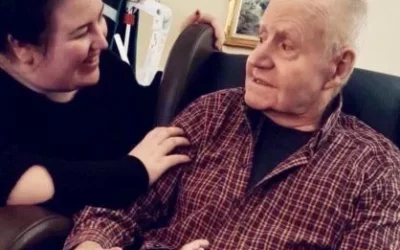What is an acquired brain injury?
An acquired brain injury (ABI) is an injury to the brain which occurs after birth. It may occur due to a traumatic injury caused by an impact to the head or because of a tumour, stroke or brain haemorrhage, to name a few.
What are the effects of an acquired brain injury?
The more severe the brain injury, the more pronounced the long-term effects are likely to be. As well as affecting physical ability, an ABI may lead to changes in the way a person feels, thinks and behaves which can alter the relationships someone has with family and friends.
As many people do not know about how an ABI can affect someone, they may find it difficult to understand how their loved one has changed. Learning about the effects of the injury and identifying ways of offering support can help during this difficult period of adjustment.
How can you provide support?
Read up on the effects of the injury:
- Try and read up on the effects of the brain injury and speak to your loved one to find out which specific effects they experience. Learn about how you can help them cope and consider that the effects may vary day-to-day; while they may seem ok one day, the next day may be a challenge.
Look out for them:
- Whilst you should respect their independence and not assume they cannot do things by themselves, it is important to offer help when it is needed.
- If your loved one has young children, offer to look after them for a few hours to provide some respite.
- Offer to provide domestic support such as shopping, cooking and cleaning from time to time.
- When out and about with a loved one bear in mind that they may struggle in busy environments so consider going somewhere quiet instead.
- Fatigue can be a common issue so keep trips out short and encourage them to rest often.
- Ask your loved one if they would like you to tell people about their brain injury when you are out together.
- Try not to take offence if your loved one cancels plans at the last minute or does not socialise as much as they did before the injury.
Encourage dialogue with the professional support network:
- If your loved one’s quality of life is being impacted by the ongoing effects of their injury, encourage them to seek support from their local social care team or doctor.
- If you suspect your loved one is feeling depressed, encourage them to talk about how they are feeling and to seek support if necessary.
- Speak to the rehabilitation team to find out which activities you can do together with your loved one to help them manage the effects of their brain injury.
Be patient and ensure all necessary support is in place:
- It is important that you do not feel rushed into bringing your loved one home too early. Only accept a proposed discharge date when you are certain that sufficient support and necessary equipment is in place at home.
- Consider using a home care company such as The Care Collection to support your loved one at home with day to day tasks. Where possible, try and use a company that has experience of working with clients who have had a brain injury.



0 Comments